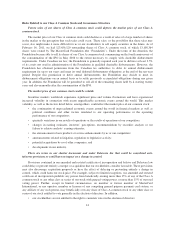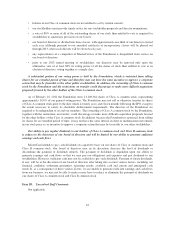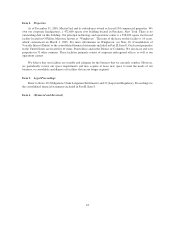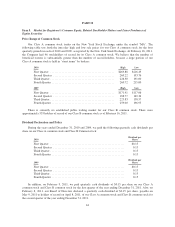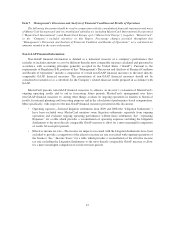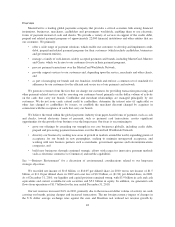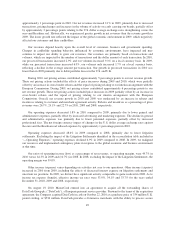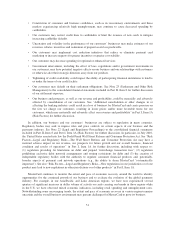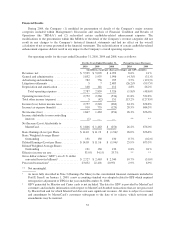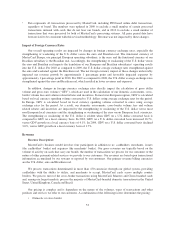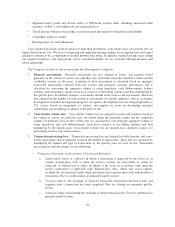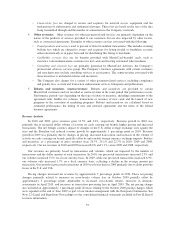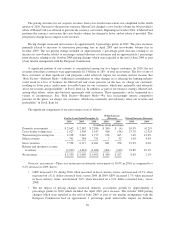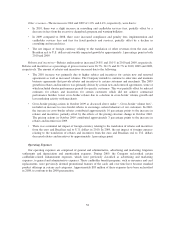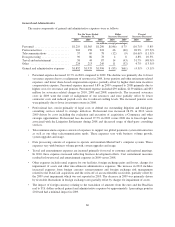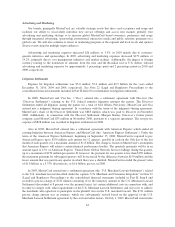MasterCard 2010 Annual Report Download - page 61
Download and view the complete annual report
Please find page 61 of the 2010 MasterCard annual report below. You can navigate through the pages in the report by either clicking on the pages listed below, or by using the keyword search tool below to find specific information within the annual report.• Constriction of consumer and business confidence, such as in recessionary environments and those
markets experiencing relatively high unemployment, may continue to cause decreased spending by
cardholders.
• Our customers may restrict credit lines to cardholders or limit the issuance of new cards to mitigate
increasing cardholder defaults.
• Uncertainty and volatility in the performance of our customers’ businesses may make estimates of our
revenues, rebates, incentives and realization of prepaid assets less predictable.
• Our customers may implement cost reduction initiatives that reduce or eliminate payment card
marketing or increase requests for greater incentives or greater cost stability.
• Our customers may decrease spending for optional or enhanced services.
• Government intervention, including the effect of laws, regulations and/or government investments in
our customers, may have potential negative effects on our business and our relationships with customers
or otherwise alter their strategic direction away from our products.
• Tightening of credit availability could impact the ability of participating financial institutions to lend to
us under the terms of our credit facility.
• Our customers may default on their settlement obligations. See Note 23 (Settlement and Other Risk
Management) to the consolidated financial statements included in Part II, Item 8 for further discussion
of our settlement exposure.
• Our business and prospects, as well as our revenue and profitability, could be materially and adversely
affected by consolidation of our customers. See “Additional consolidation or other changes in or
affecting the banking industry could result in a loss of business for MasterCard and create pressure on
the fees we charge our customers, resulting in lower prices and/or more favorable terms for our
customers, which may materially and adversely affect our revenues and profitability” in Part I, Item 1A
(Risk Factors) for further discussion.
In addition, our business and our customers’ businesses are subject to regulation in many countries.
Regulatory bodies may seek to impose rules and price controls on certain aspects of our business and the
payments industry. See Note 22 (Legal and Regulatory Proceedings) to the consolidated financial statements
included in Part II, Item 8 and Part I, Item 1A (Risk Factors) for further discussion. In particular, in July 2010,
the United States enacted into law the Dodd-Frank Wall Street Reform and Consumer Protection Act. See “Risk
Factors—Legal and Regulatory Risks—The Wall Street Reform and Consumer Protection Act may have a
material adverse impact on our revenue, our prospects for future growth and our overall business, financial
condition and results of operations” in Part I, Item 1A for further discussion, including with respect to:
(1) regulation providing for limitations on debit and prepaid “interchange transaction fees”, (2) regulation
prohibiting exclusive debit network arrangements and routing restrictions for debit and (3) the creation of
independent regulatory bodies with the authority to regulate consumer financial products and, potentially,
broader aspects of payment card network operations (e.g., the ability to deem MasterCard “systematically
important”). See also “Risk Factors—Legal and Regulatory Risks—New regulations in one jurisdiction or of one
product may lead to new regulations in other jurisdictions or of other products” in Part I, Item 1A.
MasterCard continues to monitor the extent and pace of economic recovery around the world to identify
opportunities for the continued growth of our business and to evaluate the evolution of the global payments
industry. For example, in our Asia/Pacific and Latin American regions, we have now experienced several
quarters of significant increases in dollar volume of activity on cards carrying our brands in those regions while
in the U.S. we have observed mixed economic indicators, including retail spending and unemployment rates.
Notwithstanding some encouraging trends, the extent and pace of economic recovery in various regions remains
uncertain and the overall business environment may present challenges for MasterCard to grow its business.
51


